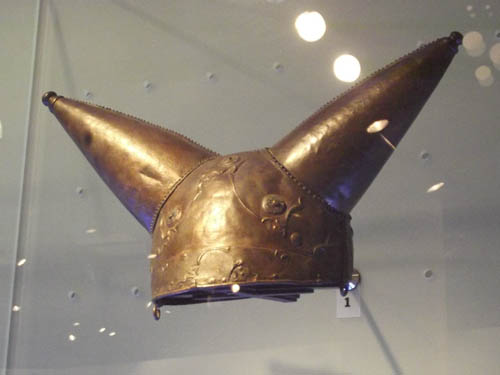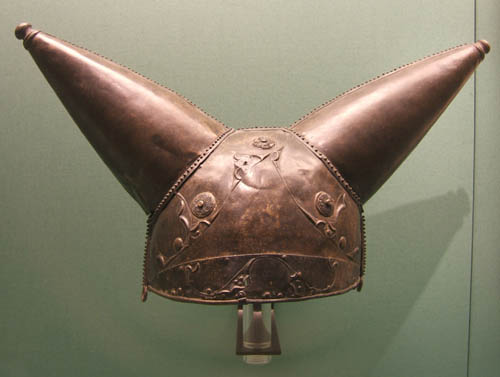CELTS may have been the real horned helmet-wearing warriors and not the Vikings, according to the British Museum.
A new exhibition features a horned bronzed helmet dredged from the river Thames which is said to be proof that horned hats were a firm favourite with the Scottish and Irish tribes of the North.
Dr Julia Farley, curator of European Iron Age collections at the museum, explained that the popular imagination of Viking helmets is in fact a product of one theatre director’s artistic licence.
An 1870 production of Wagner’s epic opera The Ring Cycle featured Norse warriors with horny helmets, and seems that the public took their queue from the stage production rather than historical fact.
But Dr Farley said the new exhibition will lay bare the British roots of the design.
“I feel that we can now reclaim the horned helmet”, she said.

“We have the horned helmet dredged up from the River Thames, and on the Gundestrup cauldron it shows people wearing horned helmets.
“I think the Celts have got a pretty solid claim to the quintessential horny helmet.”
The exhibition will move from London to the National Museums Scotland in March.
It is not clear why a Celtic helmet was recovered from the Thames. The curators suggest that the cultural differences between Celts and Anglo-Saxons may not have been as clear-cut as currently believed.
Explaining the purpose of the unusual practice, she said: “It seems that the head, and the adornment of the head, was very important.”
“This helmet is clearly something that’s being used to intimidate.
“When we see these headdresses they’ve quite often been used by warriors. I think this is a way for people to exaggerate their status in a context to do with war.”
But visitors to the exhibition may be shocked, as the horns atop the helmet more closely resemble Madonna’s infamous conical bra than a dreaded instrument of war.
Dr Farley explained that there is some evidence that the Vikings’ Scandinavian ancestors wore elaborately adorned helmets, but they did not pass this practice down.

But even these artefacts bear little resemblance to the popular idea of the Norse helmet: “To me, the [Scandinavian horns] look quite different because they’re so odd – bendy rather than the traditional side-horned helmet.”
The news comes after a number of revelations which have somewhat undermined the Vikings’ fearsome reputation.
In 2009 it was revealed that ancient medieval scripts warned Vikings against travelling to Scotland, saying a visit “may cost them their life.”
And last year researchers discovered that the Norse warriors often travelled with wives and girlfriends, making their famed marauding trips closer to romantic getaways.
The exhibition will come to Scotland’s National Museums in March.
